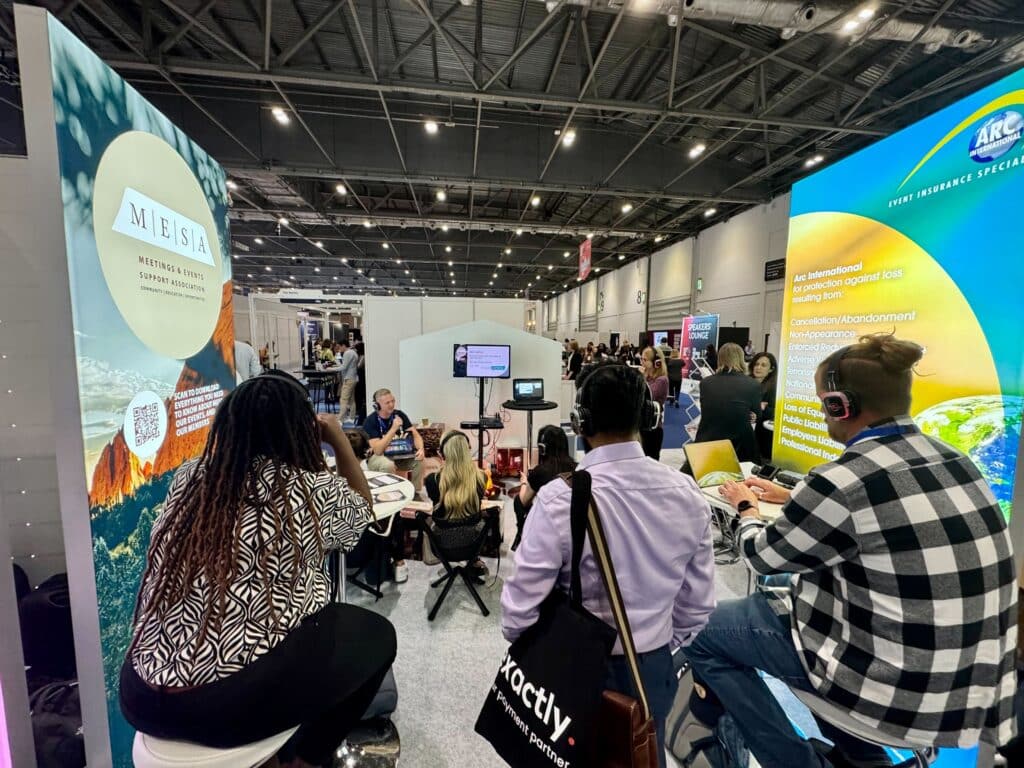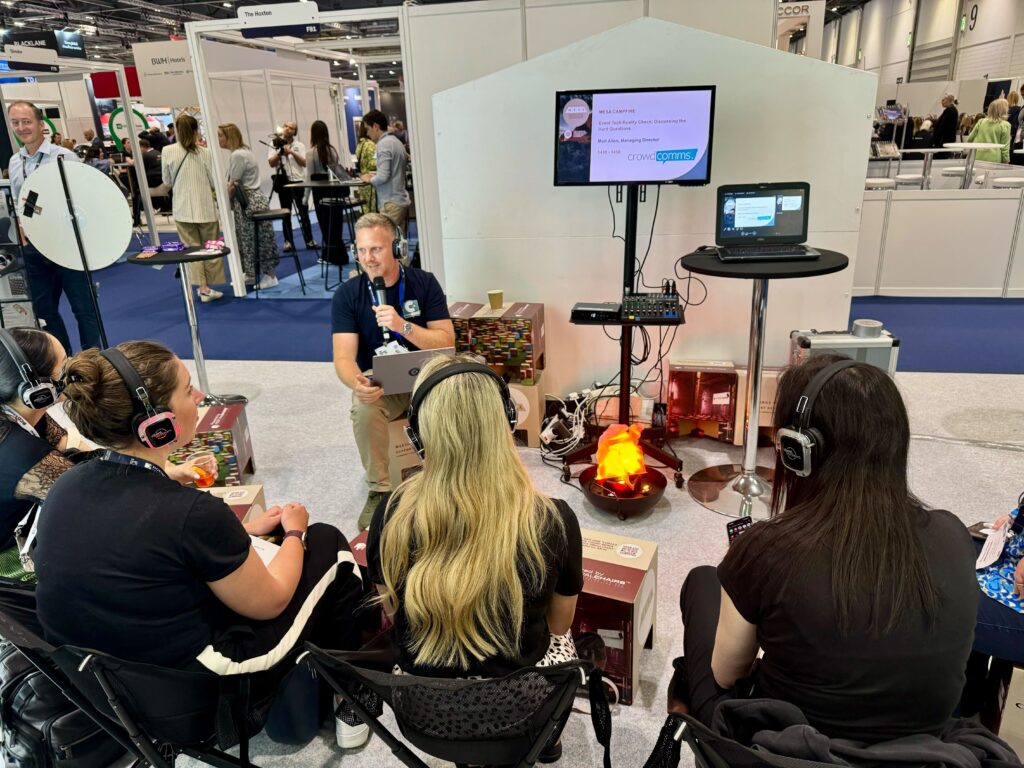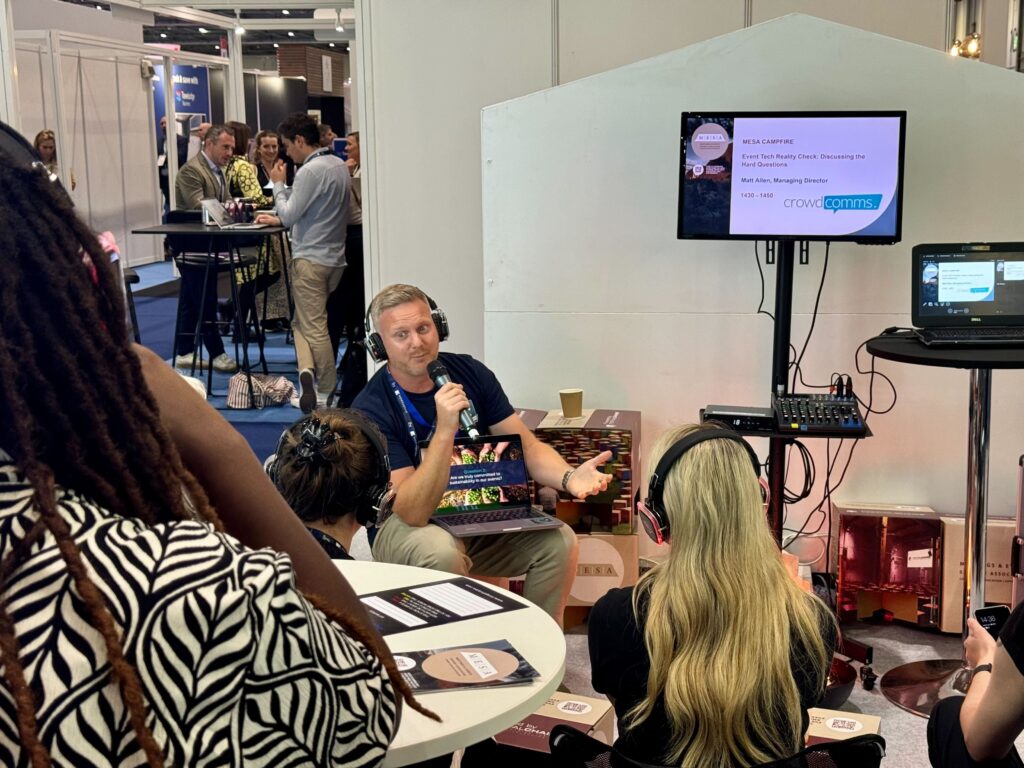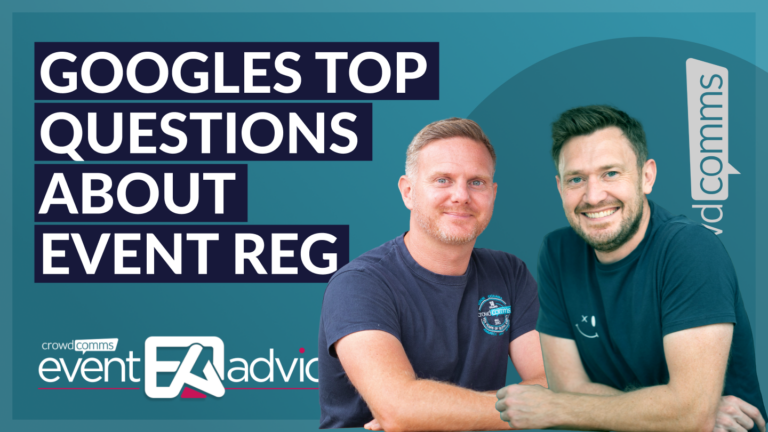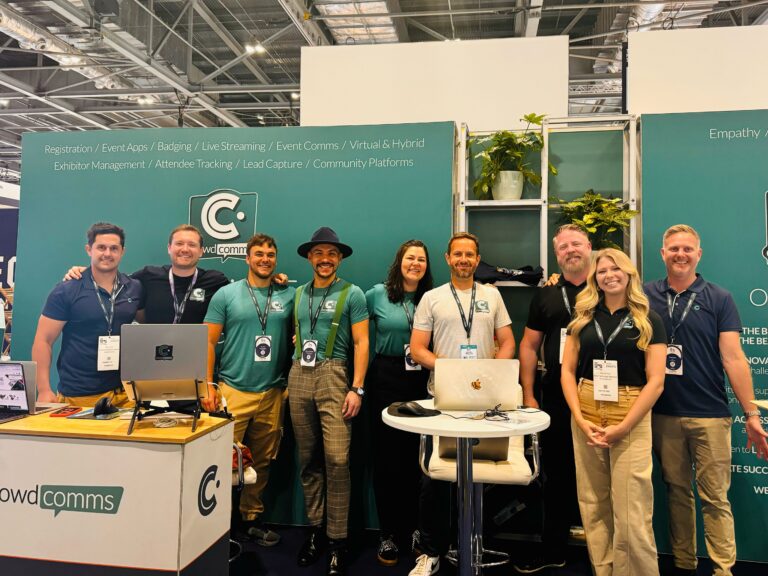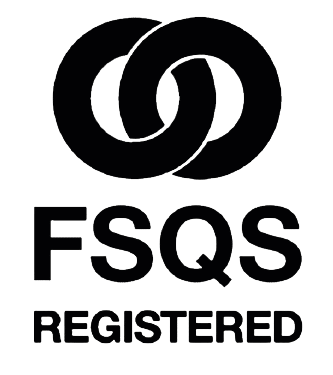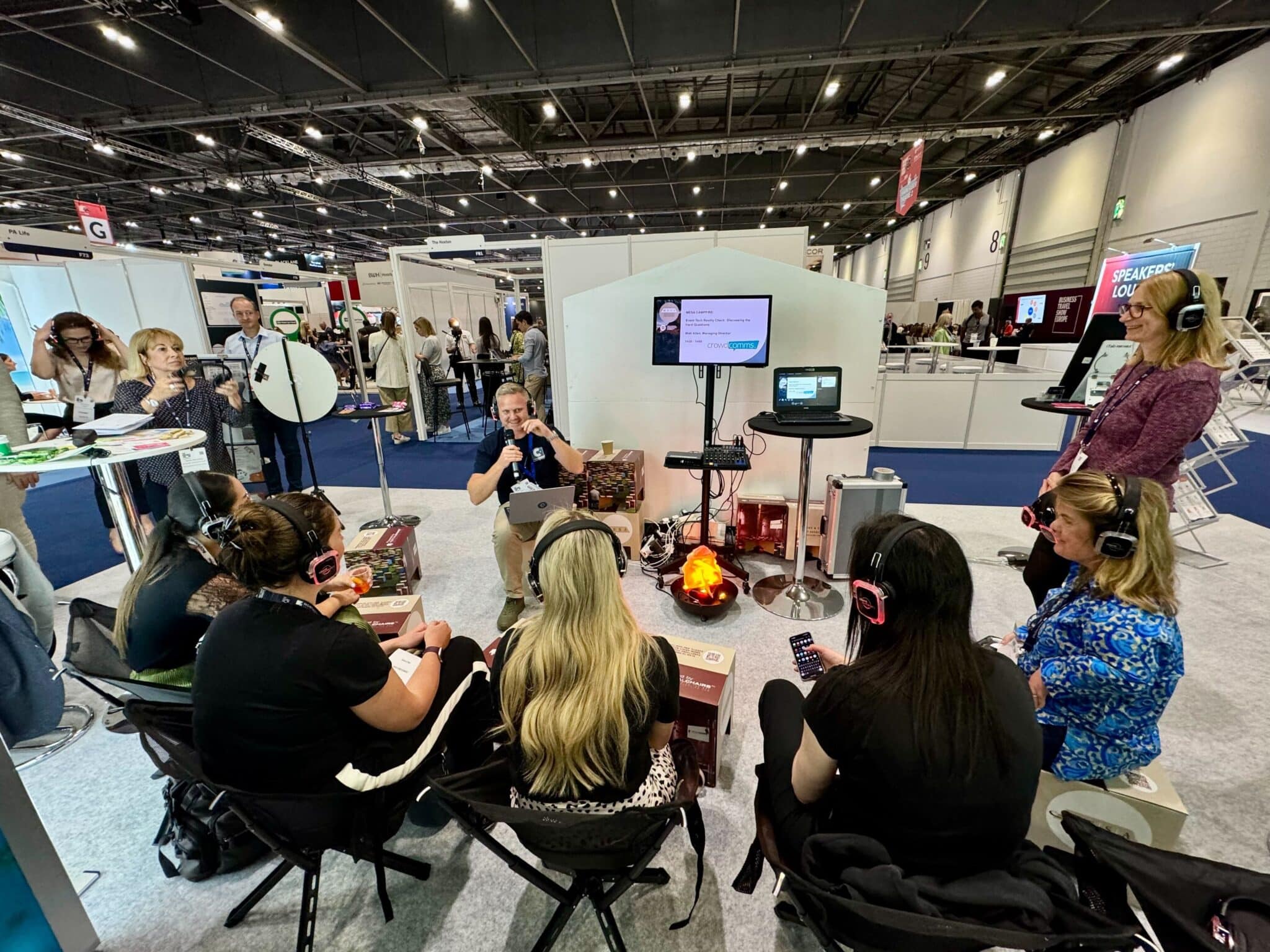
Well known for his casual yet insightful approach, Matt tackled common myths and misconceptions surrounding event technology, using a series of thought-provoking questions to spark discussion and challenge the audience’s assumptions.
In this event recap, we’ll delve into the key points from Matt’s session, exploring how he deftly navigated complex topics and clarified the realities of event tech today.
Is the Event App dead?
Contrary to popular belief, event apps are far from dead.
If they were obsolete, businesses like ours wouldn’t exist. CrowdComms, and other companies like ours, success is proof of their continued relevance to the events industry.
The Need for Genuine Purpose
A common mistake is deploying an app without a clear purpose. Successful event apps start with a valid reason and are integral to the campaign. When used correctly, they drive exhibitor-delegate engagement and audience interaction.
Event apps aren’t just digital brochures—they’re powerful tools for audience interaction. With features like Q&A sessions and live polling, you can create dynamic, engaging events that transform passive attendees into active participants.
Audience Endorsement
With a show of hands to a packed session at The Meetings Show, 100% of attendees confirmed the usefulness of mobile event apps but they agreed – the key is to find one that suits your event specific needs.
Summary: Plan Wisely
Event apps are vital tools for modern events. Start with a purpose, choose the right app and plan meticulously to enhance engagement and satisfaction at your events and conferences.
Are we truly Committed to Sustainability in Events?
The events industry faces a dilemma: balancing sustainability with commercial interests. Clients often resist eco-friendly options, favoring standard practices that seem more financially economical, although that is not the case with badge stock at CrowdComms (we actively make it cheaper – even though it costs more!).
Commercial Decisions Over Eco Choices
Our industry tends to prioritize revenue over sustainable practices. While the desire to make eco-friendly choices exists, commercial pressures frequently take precedence. We as an industry, are our own worst enemy!
Industry Sentiment on Sustainability
A quick show of hands in the audience revealed that many believe the events industry’s commitment to sustainability is superficial at best. Not in all areas, but certainly that is the perception of the audience attending this session.
Despite this, efforts like offering cost-effective eco event badges show potential for positive change.
Summary: Striking a Balance for Event Sustainability
For real progress, the events industry must prioritize sustainability over short-term profits.
As a supplier, our responsibility is to encourage clients to adopt greener practices, even at a higher cost to our business, which is a necessary step toward true commitment.
Do we genuinely care about Accessibility and Inclusivity in Events?
The commitment to accessibility and inclusivity in events is often questioned.
While technology companies strive to incorporate accessible features—such as adjustable font sizes and audio controls—clients frequently deprioritise these requirements during implementation. It becomes a nice to have as opposed to a necessity to have!
Initial Promises vs. Reality
At the RFP stage, clients emphasize the importance of accessibility, but these considerations often become less significant as projects progress. This tendency suggests that commitments to accessibility are sometimes more about ticking boxes than making meaningful changes.
Corporate World and Inclusivity
Despite ongoing discussions about the importance of inclusivity in both family life and work, practical challenges remain. For instance, when Matt’s wife had to stay home to care for their children, she missed out on a vital CPD-credited event due to the lack of a virtual or hybrid option.
This scenario highlights a significant setback: the pandemic-driven progress towards more accessible hybrid events is being undone, limiting opportunities for those who cannot attend in person.
Summary: Actions Speak Louder Than Words
Commitments to accessibility and inclusivity must be followed through with real actions, such as offering virtual or hybrid options as well as practical changes for events, such as ramps to stages being mandatory – without question which are vital to prioritise the needs of all attendees
While there is unanimous concern for accessibility and inclusivity (100% of people in the audience care), translating this concern into action remains challenging.
Are the signs of long working days changing in events?
Is the Long-Hour Culture Changing in Events?
The events industry is known for its demanding schedules, characterised by long days filled with travel and intense work. While this can be exciting initially, sustaining such a lifestyle raises questions about the industry’s overall health and well-being.
Management’s Responsibility to Staff Wellbeing
As leaders, it’s crucial to prioritise the welfare of our teams. Ensuring staff are happy and healthy involves recognising the toll that long hours and extended workweeks can take. Despite the challenges, fostering a supportive and collaborative environment helps mitigate some of the stress – not all – but some!
The Reality Onsite
When on-site at events, teams often exhibit remarkable camaraderie, friendliness, and collaboration – it’s not like any industry Matt’s worked in before. Both clients and our teams work together seamlessly, demonstrating the best of what the industry has to offer despite the tough hours.
Industry Sentiment on Change
Polling The Meetings Show audience, 50% of those in attendance of the session feel the culture of long hours is not changing. This suggests a significant portion of the industry still adheres to the old school mentality. We’d love to explore this more in a future session!
Summary: Balancing Excitement and Sustainability
While the excitement of the events industry is undeniable, it’s imperative to balance this with sustainable practices that ensure the well-being of all involved. Management must lead the charge in fostering a healthier work culture of it’s employees.
What does the Future of Events look like?
Predicting the exact future of events is challenging – no one predicted the pandemic – but one thing is clear: the events industry is booming right now.
Meeting with clients across the US and Europe over recent months, reveals a palpable sense of positivity and growth.
Current Industry Boom
There is a surge in the number of projects underway at CrowdComms, showcasing the immense value that agencies and event technology companies like CrowdComms are delivering. These initiatives are not only commercially successful but also intellectually stimulating, as clients push for innovative applications of technology to engage with their audiences in a meaningful manner.
Innovation and New Applications
The events industry is brimming with creativity, as people strive to implement new ideas and technologies. This drive for innovation is transforming the landscape of events, making each project more exciting than the last – it helps keep not only our development team excited about new features to the event platforms, but also our account management team who can talk to their clients about these exciting features to clients looking for a cutting-edge experience.
Universal Optimism
An impressive 100% of the audience surveyed feel optimistic about the future of events. This unanimous sentiment highlights the collective confidence in the industry’s ongoing evolution and success.
Conclusion: Embracing the Positive Momentum
While the future is uncertain, the present is filled with opportunity and enthusiasm. By focusing on the current boom and continuing to innovate, the events industry is set to thrive in ways we can only begin to imagine.
The Gap Between AI Talk and Implementation in Events
Why the Disconnect?
There’s a lot of buzz around AI in the events industry, but actual implementation remains limited.
Tech companies often dominate the conversation, standing on stage and discussing AI’s potential rather than showcasing real-world applications. There was a session by Dr Mykyta Fastovets here at The Meetings Show which did discuss practical applications of AI in events, something rare to see.
Current State of AI in Events
While some companies like CrowdComms have started to incorporate AI into its event platform, the technology’s complexity means many are hesitant to dive in fully until it’s properly understood, tested and secure. Despite the hype, every event seems to feature at least one session on AI, yet practical examples are scarce.
Audience Sentiments
The audience is divided on the topic: 50% find discussions about AI a bit boring and are unsure of its relevance aside from using it in content creation. They express a clear desire for concrete examples of how AI can be used in events to spark genuine interest.
Conclusion: Moving from Talk to Action
To bridge the gap between discussion and action, the industry needs to demonstrate tangible applications of AI. Showcasing how AI can enhance events will not only pique interest but also drive broader adoption. The key lies in moving beyond talk to real, deliverable solutions.
Are Virtual and Hybrid Events Here to Stay or Just a Trend?
At CrowdComms, 35% of our revenue comes from virtual and hybrid events. This substantial percentage indicates their importance, especially for corporate event organisers and planners who use these formats for webinars, training, company updates, town halls, and partner communications.
Post-Pandemic Shifts
The landscape of virtual and hybrid events has evolved since the pandemic. We now see shorter sessions, shorter days, and a more straightforward approach to content delivery. As always, content remains king—delivering valuable, engaging material is crucial to success.
Role as a Venue
In this context, we function merely as a venue. By hosting the right event with compelling content, audience engagement naturally follows.
Summary: It’s not Just a Trend
Given their significant role in revenue and the shift towards more efficient formats, virtual and hybrid events are likely here to stay. The focus on delivering valuable content ensures they remain a staple in the event industry moving forward.
Conclusion: The Ever-Evolving Landscape of Events
The events industry stands at a fascinating crossroads, driven by rapid technological advances, innovative solutions, and changing societal norms. The current buzz around AI and its potential, the proven success and continuing relevance of virtual and hybrid events, and the universal optimism about the future all point to a dynamic and thriving sector. However, it’s crucial for industry leaders to prioritise the well-being of their teams, foster a culture of sustainability, and move beyond mere discussions to tangible implementations. As we look forward, embracing these opportunities with a balanced approach will ensure the continued growth and success of the events industry, offering memorable and impactful experiences for all.
To find out how we at CrowdComms can help you take your events to the next level, visit our website or get in touch with us today. Let’s work together to create unforgettable experiences and drive the industry forward!
